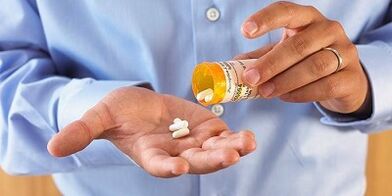If prostatitis appears, it is likely that special treatment is required.Bacterial disease develops in a third of patients.Bacteria need to be suppressed using suitable medications.Prostatitis antibiotics are prescribed when the diagnosis is confirmed by a preliminary examination.In order for the treatment to have the desired effect that can be careful on the body, choose drugs that will help you best, find out how to take them and use possible hazards.
Advantages of treatment for antibiotics
Modern medicine uses antibiotics for prostatitis or other diseases, thanks to their abilities:
- Rapidly destroy the source of the disease and eliminate inflammation;
- Develop substances that kill or stop the spread of bacteria and large viruses but are safe for macroorganism cells;
- Act from the outside (candles, ointments) and other methods of administration: intramuscularly, orally, intravenously;
- Fight with many pathogens of diseases (wide range of antibiotics).
Major groups of antibacterial medicines used for prostatitis
Antibiotics are a relatively new substance that opened in the 20s of the last century.A large list of drugs neutralizes viruses, which helps to remove the causes of prostatitis and other diseases.The different nature of the effect, the differences in chemical structure have made it possible to distinguish several groups of antibiotics with prostatitis of bacterial nature: chronic or acute.
Fluoroquinolones
Today, fluoroquinolones are chemically synthesized.Active substances that affect different types of bacteria are especially well treated with chronic form of the disease.Fluorinolones are absorbed as quickly as possible in the gastrointestinal tract.From here they move easily in the cells of the organs and tissues, destroying bacteria.Medications cause gastrointestinal tract and nervous system, allergies.In rare cases, kidney disease, musculoskeletal system, heart, candidiasis, colitis are observed.
Tetracyclines
The family of tetracyclines includes a wide range of action antibiotics in composition and properties.They have the same mechanism of influence on microbes, tight characteristics, and full cross stability.If one drug stopped acting on the body, it would also be ineffective.To achieve results, it is best to take drugs that have a different method of work.Tetracyclines are very active for prostatitis -causing bacteria, but it is difficult to transmit.
Penicillins
Penicillins block the synthesis of peptidoglycan from which the cell wall of the bacteria is built.From here they die.The mammalian body does not produce peptidogica, so the drugs are safe for humans, the only thing that can meet them to get them - allergies.The most commonly used medicines for the penicillin group prostatitis are tablets.
Cephalosporins
The bactericidal principle of cephalosporins is dangerous for microorganisms.It damages their cell wall and causes death.The assimilation of this group of drugs from the gastrointestinal tract is weak.They irritate the mucous membranes, cause allergies, kidney disorders, are contraindicated in danger of meningitis.Used intramuscularly.
Macrolides
Macrolides are the least toxic antibiotic of natural origin, which prevents the reproduction of bacteria.These drugs are rarely used because efficiency is not proven.Patients tolerate therapy with these agents well with prostatitis.Preparations rarely promote allergies, there are no cases of liver or kidney inhibition, joint destruction, bone tissue, toxic effects.
Antibiotics forcing a scheme for the treatment of prostatitis in men
In order to effectively cure the disease, it is necessary to make a diagnosis that shows the type of disease bacteria-defeats in a particular patient, their sensitivity to medication.Based on the results of the tests, the doctor will decide on what it means to treat chronic prostatitis or acute form of the disease.The combination of procedures will help to alleviate the inflammation of the prostate gland if the disease appears due to bacteria.
Prostatitis treatment regimen includes:
- Taking antibiotics to eliminate bacteria;
- Use of medication to improve blood circulation, reduce swelling;
- Anti -matthore Addition - If you need to relieve pain by reducing gland edema;
- Immune system regulators;
- Vitamins A, B6, E, C;
- Microelements: selenium, zinc, magnesium;
- Sedatives;
- Herbs (Lingonberry, Elderberry, St. John's Wort, Trench and Goldener);
- Prostate Massage - It relieves inflammation, eliminates stagnant secrets;
- Exercise - Stimulate blood circulation.
In the acute form of pathology
Treatment is performed in hospital or under medical control.Use medicines that affect perfectly: cephalosporins, tetracyclines and inflammation - fluorochinolones.For rapid effect, the urologist can prescribe two antibiotics.
The result of acute inflammatory therapy is usually seen immediately, but it is strictly impossible to take medication.Take a 4 -week course to the end and look at the dose to avoid the inflammatory process.Otherwise, it can transform it into a chronic form.If you obviously follow all the recommendations of the urologist, the disease will be recovered forever and will not return.
In chronic prostatitis

A sluggish chronic course of prostate disease is more common.Periods of peace have been replaced by exacerbations.Is chronic prostatitis treated?The prognosis is less soothing than in the case of acute inflammation.The results of the therapy are weaker: the pathology alters the structure of the gland tissue so that the antibiotic does not maintain them for a long time.Appointments:
- Preparations are made, depending on the nature and quality of the microflora sensitivity.
- Highly effective medicines for a wide range of action, especially cephalosarin and macrolides, fluoroquinolones.
- The minimum course is a month, however, with several cycles that are delayed are often performed.It is impossible to treat when improved: changes can be deceived.
What antibiotics are the most effective
To cure or reduce infectious prostatitis manifestations, strictly follow your doctor's recommendations.Start the course only after the diagnosis when your doctor has realized the nature of the disease.Independent treatment of the home is full of devastating results, malfunctions in the work of body systems.
There are any side effects and contraindications
Often, along with drugs, microflora recovery compositions are prescribed.Keep in mind such possible reactions to antibiotics:
- Gastrointestinal malfunction;
- Allergic rash;
- Intoxication (fever, pain, diarrhea);
- Deterioration of wells.
Antibiotics are not used to treat non -infectious (stagnant) inflammation.It is forbidden to accept them:
- With allergies;
- Kidney, liver disorders;
- Pregnancy;
- Breastfeeding;
- Children.




























